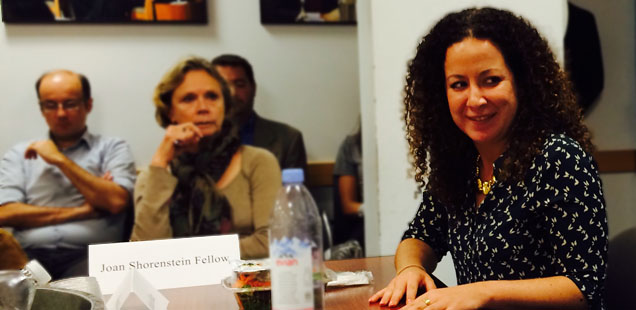September 23, 2014 — Putting the “new” back in “news” is the goal of BuzzFeed’s growing coverage of global affairs, said Miriam Elder, foreign editor for the online media outlet. BuzzFeed World, which started in August 2013, has been hiring correspondents and “trying to think of new ways to cover the world,” Elder told a Shorenstein Center audience.
To distinguish its coverage from that of legacy news media, BuzzFeed’s approach is to steer clear of the classic “middle length” story describing the basics of what happened, and instead to “always try to push it with some unique and meaningful angle,” Elder said. The outlet’s approach results in some stories that are exceptionally brief — just 300 words, often with related multimedia — that do the job of disseminating “bits” of information. But it also means big takeouts of several thousand words.
Elder pointed to two stories in particular that distinguish BuzzFeed’s recent long-form global coverage: “One Man’s Journey to Become the First American Suicide Bomber in Syria,” by Mike Giglio, a correspondent on the Turkish-Syrian border; and “In Sweden Being a Prostitute Is Legal — but Paying One Isn’t,” by BuzzFeed’s international women’s rights correspondent, Gina Moore, filed from Stockholm. The latter saw a half-million views on the Web, Elder said.
BuzzFeed is pushing to hire even more reporters in countries such as China and Mexico, she said. It’s part of what Elder characterized as a new phase in the development of online news media emphasizing more original reporting, as distinguished from the previous “big aggregation phase,” embodied by the likes of the early Huffington Post.
BuzzFeed, which gets some 70% of its traffic from social media, has recently seen its bottom line enhanced by $50 million in venture capital, part of the excitement around new online content models. Further, it continues to employ a “creative” team — which Elder compared to the ad firm in Mad Men — to produce “native advertising,” stories that are labeled as ads but nonetheless raise ethical concerns.
Elder, who previously worked for The Guardian in Russia, said that reporting for BuzzFeed has more similarities than differences compared with legacy news organizations: “What we do, at the end of the day, is meet people and pick up phones.” Still, she recalled, before she was hired, “I knew BuzzFeed from my Facebook feed as a purveyor of cats and lists.”
Even with rekindled resources and attention, she said, foreign news coverage and its future remain uncertain as new media outlets attempt to fill the void created by the closing of so many traditional foreign bureaus. Elder said that some of the more authoritarian countries are now stating “We don’t accredit online news organizations,” which she calls “an excuse that’s being used to basically dampen reporting.”
Photo by Nancy Palmer and article by John Wihbey of the Shorenstein Center.


